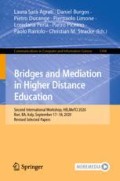Abstract
Several academic institutes provide students, as the first programming course, with an understanding of Object-Oriented Programming (OOP) paradigm. This requires the teacher to face several obstacles due to the necessity to explain various and deep concepts such as type, data abstraction, encapsulation and different forms of polymorphism such as overloading, coercion, sub-typing, and parameterization. This paper proposes and evaluates a teaching strategy based on a flipped classroom approach for one selected topic in a second-year programming university course, Programming II, held at the University of Bari and focused on the OOP paradigm. This approach lets the students learn and train on their own before coming to class. Here, they will apply the knowledge during face-to-face lessons to elaborate, reflect and compare on what has been learned. We provided a preliminary evaluation of the approach through a quasi-experiment aiming at comparing two groups of students: one instructed by a flipped classroom approach and the other one by the traditional approach. Results show that the flipped group understands better concepts and produces better source code than the traditional group.
Access this chapter
Tax calculation will be finalised at checkout
Purchases are for personal use only
References
Ardimento, P., Bernardi, M.L., Cimitile, M.: On the students’ misconceptions in object-oriented language constructs. In: Burgos, D., et al. (eds.) HELMeTO 2019. CCIS, vol. 1091, pp. 97–112. Springer, Cham (2019). https://doi.org/10.1007/978-3-030-31284-8_8
Ardimento, P., Bernardi, M.L., Cimitile, M., Ruvo, G.D.: Learning analytics to improve coding abilities: a fuzzy-based process mining approach. In: 2019 IEEE International Conference on Fuzzy Systems (FUZZ-IEEE), New Orleans, LA, USA, pp. 1–7 (2019). https://doi.org/10.1109/fuzz-ieee.2019.8859009
Ardimento, P., Bernardi, M.L., Cimitile, M.: Software analytics to support students in object-oriented programming tasks: an empirical study. IEEE Access 8, 132171–132187 (2020). https://doi.org/10.1109/ACCESS.2020.3010172
Ardimento, P., Bernardi, M.L., Cimitile, M., De Ruvo, G.: Mining developer’s behavior from web-based IDE logs. In: 2019 IEEE 28th International Conference on Enabling Technologies: Infrastructure for Collaborative Enterprises (WETICE), Napoli, Italy, pp. 277–282 (2019). https://doi.org/10.1109/wetice.2019.00065
Dimauro, G., Scalera, M., Visaggio, G.: The educational cloud, problems and perspectives. Syst. Cybern. Inform. 14(6), 40–46 (2016)
Scalera, M., Gentile, E., Plantamura, P., Dimauro, G.: A systematic mapping study in cloud for educational innovation. Appl. Sci. 10(13), 4531 (2020). https://doi.org/10.3390/app10134531
Novak, J.D., Cañas, A.J.: Building on new constructivist ideas & CmapTools to create a new model for education. In: Concept Maps Theory, Methodology, Technology: Proceedings of the First International Conference on Concept Mapping, vol. 1, no. January, pp. 469–476 (2004)
Kirschner, P.A., Sweller, J., Clark, R.E.: Why minimal guidance during instruction does not work: an analysis of the failure of constructivist, discovery, problem-based, experiential, and inquiry-based teaching. Educ. Psychol. 41(2), 75–86 (2006)
Abeysekera, L., Dawson, P.: Motivation and cognitive load in the flipped classroom: definition, rationale and a call for research. High. Educ. Res. Dev. 34(1), 1–14 (2015)
Lo, C.K., Hew, K.F.: A comparison of flipped learning with gamification, traditional learning, and online independent study: the effects on students’ mathematics achievement and cognitive engagement. Interact. Learn. Environ. 28(4), 464–481 (2020)
Bergmann, J., Sams, A., Flip Your Classroom: Reach Every Student in Every Class Every Day. International Society for Technology in Education, Washington, DC (2012)
Ardimento, P., Boffoli, N., Convertini, V.N., Visaggio, G.: The lifelong learning in the university: learning networks and knowledge transferring. J. E-Learning Knowl. Soc. 7(1), 21–31 (2011). https://doi.org/10.20368/1971-8829/484
Lin, H.C., Hwang, G.J.: Research trends of flipped classroom studies for medical courses: a review of journal publications from 2008 to 2017 based on the technology-enhanced learning model. Interact. Learn. Environ. 27(8), 1011–1027 (2019)
Lin, C., Hwang, G.: A Learning analytics approach to investigating factors affecting EFL students’ oral performance in a flipped classroom. J. Educ. Technol. Soc. 21, 205–219 (2018)
Lo, C.K., Hew, K.F., Chen, G.: Toward a set of design principles for mathematics flipped classrooms: a synthesis of research in mathematics education. Educ. Res. Rev. 22, 50–73 (2017)
Kiat, P.N., Kwong, Y.T.: The flipped classroom experience. In: 2014 IEEE 27th Conference on Software Engineering Education and Training, CSEE T 2014 - Proceedings, pp. 39–43 (2014)
Bhagat, K.K., Chang, C.N., Chang, C.Y.: The impact of the flipped classroom on mathematics concept learning in high school. Educ. Technol. Soc. 19(3), 134–142 (2016)
Clark, K.R.: The effects of the flipped model of instruction on student engagement and performance in the secondary mathematics classroom. J. Educ. Online 12(1), 91–115 (2015)
Unal, Z., Unal, A.: Comparison of student performance, student perception, and teacher satisfaction with traditional versus flipped classroom models. Int. J. Instr. 10(4), 145–164 (2017)
Wasserman, N.H., Quint, C., Norris, S.A., Carr, T.: Exploring flipped classroom instruction in calculus III. Int. J. Sci. Math. Educ. 15(3), 545–568 (2015). https://doi.org/10.1007/s10763-015-9704-8
Akçayır, G., Akçayır, M.: The flipped classroom: a review of its advantages and challenges. Comput. Educ. 126, 334–345 (2018)
Cook, T.D., Campbell, D.T.: The causal assumptions of quasi-experimental practice - the origins of quasi-experimental practice. Synthese 68(1), 141–180 (1986). https://doi.org/10.1007/BF00413970
Scalera, M., Serra, A.: Customer centric strategies for value creation: academic experimentation. J. E-Learning Knowl. Soc. 10(2), 65–76 (2014). https://doi.org/10.20368/1971-8829/922
Grissom, R.J., Kim, J.J., Effect Sizes for Research: A Broad Practical Approach, 2nd edn. Lawrence Erlbaum Associates Publishers, Mahwah (2005)
Ardimento, P., Cimitile, M., Visaggio, G.: Distributed software development with knowledge experience packages. In: Demey, Y.T., Panetto, H. (eds.) OTM 2013. LNCS, vol. 8186, pp. 263–273. Springer, Heidelberg (2013). https://doi.org/10.1007/978-3-642-41033-8_35
Author information
Authors and Affiliations
Corresponding author
Editor information
Editors and Affiliations
Rights and permissions
Copyright information
© 2021 Springer Nature Switzerland AG
About this paper
Cite this paper
Ardimento, P., Scalera, M. (2021). Experimentation of Flipped Learning in a University Course on Object-Oriented Programming Paradigm. In: Agrati, L.S., et al. Bridges and Mediation in Higher Distance Education. HELMeTO 2020. Communications in Computer and Information Science, vol 1344. Springer, Cham. https://doi.org/10.1007/978-3-030-67435-9_19
Download citation
DOI: https://doi.org/10.1007/978-3-030-67435-9_19
Published:
Publisher Name: Springer, Cham
Print ISBN: 978-3-030-67434-2
Online ISBN: 978-3-030-67435-9
eBook Packages: Computer ScienceComputer Science (R0)

